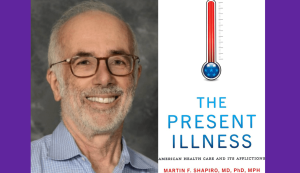
Health services researcher and professor of medicine Martin F. Shapiro discussed his book “The Present Illness: American Health Care and its Afflictions,” at the Roosevelt House Public Policy Institute at Hunter College on April 17. In the book, he unfolds the disparities within America’s health care system, why it’s so difficult to fix, and the approaches we must take to make a fair and equitable system for everyone.
Shapiro began the discussion by explaining how, although the health care industry is experiencing financial prosperity, it’s still plagued by significant inequality. He reports on a Central American immigrant named Luis who suffered from Hepatitis C which later progressed to liver disease. Since Luis was an undocumented immigrant, he didn’t have insurance, and he didn’t have available funds to afford his medical finances. But luckily, after significant effort, he was able to find a hospital that waived some of his fees to make his medical treatment more affordable. Shapiro states that this shows the inequity of our health care system and how if you lack citizenship or the finances, you won’t have access to treatment, or worse, you’ll be sent home to die.
“In American health care, some lives are cheap,” said Shapiro.
According to Shapiro, “Fixing health care is very difficult because of the interplay of consciousness, the commodified world of health care, and the toxic relationships and the problematic communications that pervade it.” For America to fix its system, Shapiro says that we must acknowledge and address these issues that undermine progress in health care.
He finds that the major components within health care that stand in the way of an equitable system are hospitals, medical schools, patients, governments, and employers among other corporations in the health sector. Our capitalistic society reinforces treating health care as a commodity rather than a system to ensure the health of individuals. Paying CEOS of health corporations expensive salaries, charging excessive prices for pharmaceuticals, and high tuition of medical schools all contribute to the failure of our health system.
Beyond the financial issues within health care, Shapiro reports that there’s a massive empathy gap within the health sector. Doctors aren’t interested in building relationships and effectively communicating with their patients since it won’t be well rewarded. For health employers to build empathy, he suggests that we must incentivize clinicians to attend psychotherapy for a better relationship with patients, all physicians should have periodic training, and medical schools should accept more students with a commitment to social betterment rather than students with high test scores.
For medical schools, Shapiro suggests that we replace pre-medical science requirements with ethics, humanities, and other social science courses. Students should demonstrate a capacity for empathy and ethics and social skills should comprise half of the first two years of the medical curriculum. “Medical schools should identify applicants motivated by altruism, not prestige or income,” he said.
Lastly, Shapiro stated that patients treat health care as a commodity as well. Shapiro said, “This reflects a world in which everything is commodified, in which some people feel entitled to get whatever they want.” He quotes the book “Habits of the Heart,” written by Robert Bellah ‘American individualism has become an autonomy disassociated from meaningful societal integration.”’
Shapiro concluded his discussion by reinforcing that for policy changes to work effectively, every person involved in the health sector must want it to pass. “Make it a priority to transform discourse around health care and relationships within it and pursue a consensus that we’re all in the same boat and don’t give up everytime we fail to get there.”









